QuestionQUESTION: Hi Cindy,
This is a strange question, but I was wondering if you could describe the size and consistency of normal, healthy ferret stool.
I'm wondering this now because I just realized the size difference in stool between my 3 month old kit (large, think stools) and my 4 year old male furball (medium, not as thick stools).
I'm worried that my 4 year old may have a partial obstruction, although he is not showing any signs, other than stool that is smaller than my kit's.
I know I should watch out for "thin, ribbon-like stool", but how thin is "ribbon-like"? How thick should the stool be? Is the diameter of a pencil(not the lead) adequate (I'm not sure how else to describe it!)?
My 4 year old male is a 3 pound ferret.
Thanks for the info!
-Emilia
ANSWER: Hi Emilia,
That is not a strange question at all. Each ferret's stool will look differently, depending on how well they can digest the food. An older ferret is difficult to compare to a growing kit, since their GI tracts process the food differently.
A healthy ferret stool is about as thick as a normal pencil. As long as it is not extremely thin tarry, or your ferret has difficulty dedicating, you should continue to monitor him for any changes. You might want to consider separating him from the kit so you can watch his defecation and food intake more easily.
Signs of obstructions are vomiting, diarrhea, anorexia, lethargy, and weight loss. If you notice any of these symptoms, have him seen by a vet ASAP for x-rays. A GI obstruction is serious and considered an emergency. A partial obstruction can move and become stuck, so continue to watch him closely.
Please let me know if you have any other questions!
-Cindy P.
---------- FOLLOW-UP ----------
QUESTION: Hi Cindy,
Thanks for the reply. He definitely does not have an obstruction, my other young male ferret had to have emergency surgery for a hairball obstruction, so I know the signs. Unfortunately Jack didn't survive his ordeal, even with the surgery.
Jet's stool (the four year old male) actually was very bright yellow, mucousy, then it became very seedy. I thought that perhaps he was having GI issues due to the stress of losing his best friend. I brought him to the vet, and he was put on antibiotics (amoxicillin) for a week. This was a two weeks ago. Now I'm thinking that perhaps my new kit may have been an ECE carrier. The baby has not had any symptoms.
I gave Jet some pepto bismol, and for the last day or so, his stools have been improving. They are a good color, and well formed. They are no longer seedy looking. He has an appointment on Monday. He's been legarthic over these past few weeks. I give him pedialite to make sure he is not dehydrated, but through all this he has been an amazing eater. He eats and drinks on his own, and has not lost any weight.
It's the legarthy and the watery eyes that have been worrying me. Perhaps he is still grieving, and if it was ECE, he may just be getting over it.
Other than ECE, or irritable bowel syndrome, or even helicobacter mustelidae acting up, what else could this be? I want to put him back on antibiotics for a longer amount of time, and on Monday, I intend on having a blood test done, as well as an x-ray. Do you recommend any other tests?
Also, his lymph nodes in his thighs are a bit swollen, but the other lymph nodes are fine. I was worried about intestinal lymphoma, but he has not lost any weight at all. He's a big ferret.
Any suggestions?
-Emilia
ANSWER: It is great that an obstruction can be ruled out! Obstructions are expensive to remove, although ECE can be just as dangerous without proper treatment.
Kits are common carriers of ECE, which can be just as deadly to ferrets. Dehydration is the main thing you need to watch out for. The "seedy" stool was probably due to the expulsion of the material before it was completely digested.
It seems like you are doing everything right. It is wonderful his stool is back to normal and he is eating/drinking and has not lost any weight. I would continue to monitor him closely and make sure he continues to improve. I would expect his lymph nodes to be a bit swollen since they are important to immune function.
I would certainly have an x-ray and blood work done to rule out any other problems. It is difficult to test for ECE once he has been on antibiotics, but basic blood work will let you know if any of his systems are compromised.
-Cindy P.
---------- FOLLOW-UP ----------
QUESTION: Hi Cindy!
Thank you so much for your help. I really appreciate it. The x-ray showed no visible masses, but fluid in the abdomen. The intestines and other organs looked normal. I am still waiting on the blood results. My vet still wants to rule out cancer. I have a couple of questions that I would really appreciate your help with.
How "rock hard" are the lymph nodes of a ferret with lymphoma? Do they literally feel as hard as marbles? Jet's are squishy. Which lymph nodes typically enlarge? Jet has swollen lymph nodes behind his knees, and maybe in his abdomen. The lymph nodes under his armpits have gotten smaller. Does a ferret with lymphoma always lose weight (by the time the lymph nodes are swollen), or is it possible that a ferret's weight remains stable even though he has the disease? Jet is a stable (and hefty) 3 pounds.
Sorry for the bombardment of questions. I am just not sure what is wrong with him. I know you cannot give me a diagnosis, but I know you are very experienced with ferrets, and perhaps you have experience with some of these symptoms. Jet's stools still are somewhat seedy (sometimes) although well formed. His eyes are a little brighter. He also has an enlarged spleen, but it is by no means protruding, or causing an asymmetry.
Thank you again,
-Emilia
AnswerHello again Emilia,
I am glad my reply is helpful =D That is what we are here for.
The lymph nodes can vary from squishy to rock hard. It depends on the infection and how the ferret reacts. Lymphoma is a tricky disease because the symptoms are so vague. Some ferrets show multiple symptoms, while others do not act any differently. In general, more symptoms appear as the disease progresses.
Common symoptoms (can vary):
hard, bean shaped lymph nodes that do not appear painful
enlarged spleen/liver
weight loss
vomiting
dehydration
hind leg weakness
difficulty breathing (due to enlarged thymus) or coughing
Here is more information:
http://www.ferretcentral.org/faq/med/lymph.html
http://www.2ndchance.info/lymphomaferret.htm
http://www.ferret-universe.com/health/lympho.asp
In ferrets, lymphosarcoma is the most common malignancy. There are two forms of the disease, a rapidly progressive form which is most common in ferrets under 2 years of age, and a more chronic form which affects ferrets 5-7 years of age.
Has the blood work come back with any results? I am hoping for the best. Please keep me posted, I will have my fingers crossed.
-Cindy P.

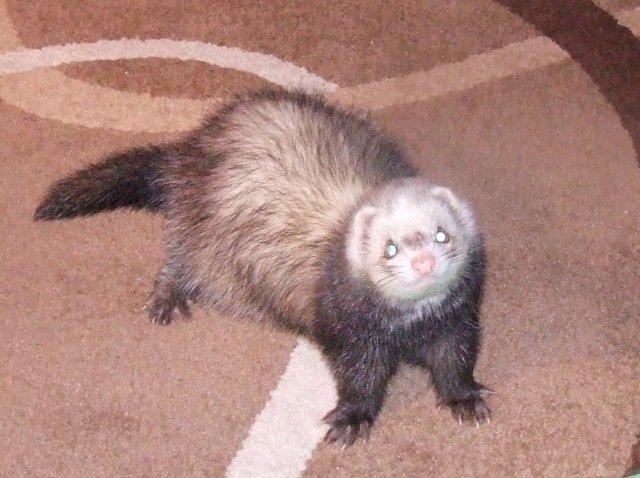 Piper
QuestionQUESTION: Hi, and thankyou for your quick respo
Piper
QuestionQUESTION: Hi, and thankyou for your quick respo
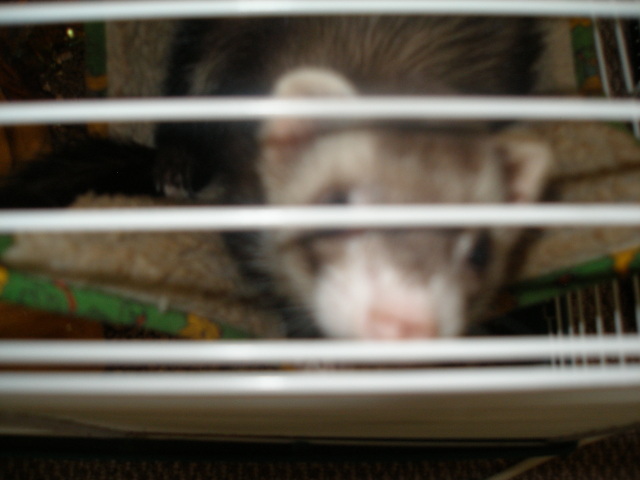 ferret losing weight seems listless
Question
mario
Hello my daughters ferret is a neutered
ferret losing weight seems listless
Question
mario
Hello my daughters ferret is a neutered
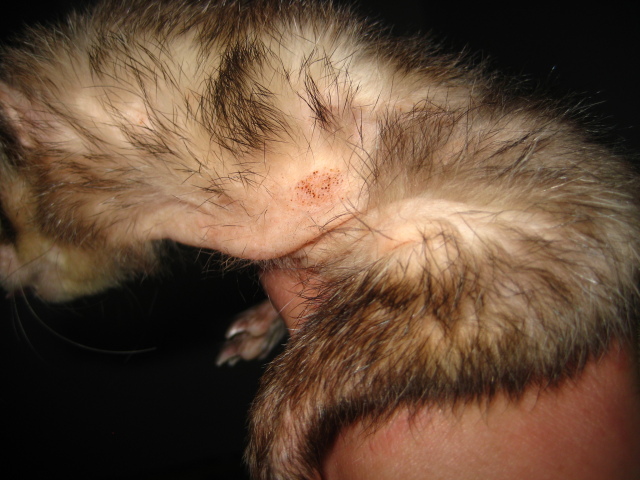 Skin Condition
Question
Chewie
I own 5 ferrets, ranging from 3 to 5. I
Skin Condition
Question
Chewie
I own 5 ferrets, ranging from 3 to 5. I
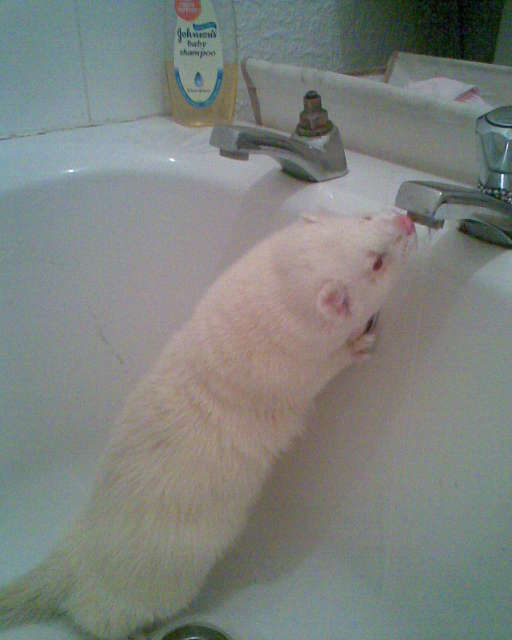 ferret love
Question
snert
hi my name is john from england i had to
ferret love
Question
snert
hi my name is john from england i had to
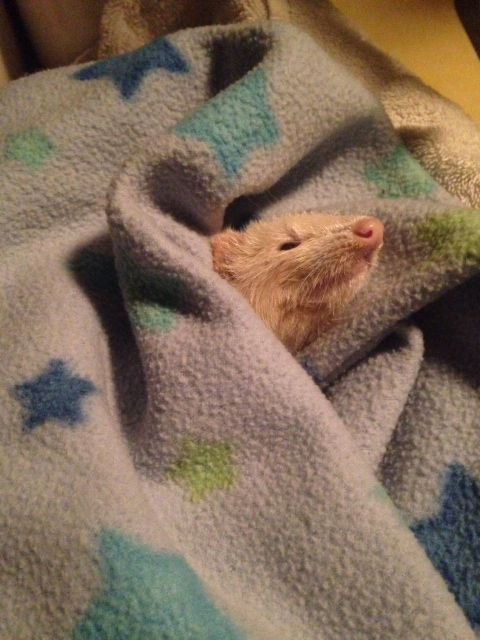 My ferrets die
Question
Mia
My ferret die lest nite she was ten
My ferrets die
Question
Mia
My ferret die lest nite she was ten